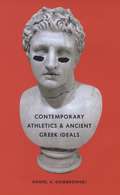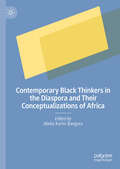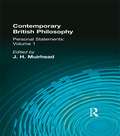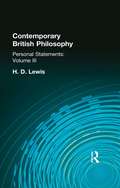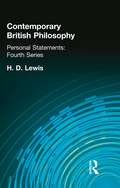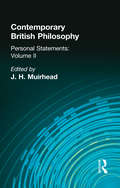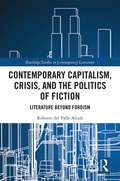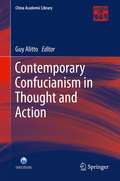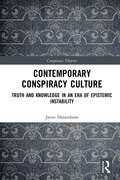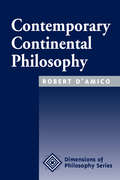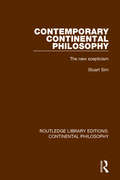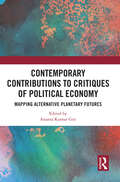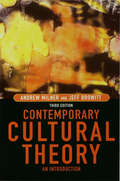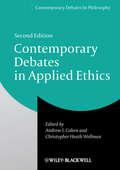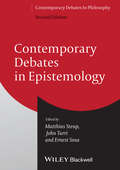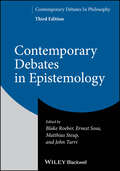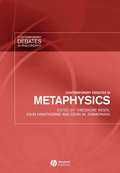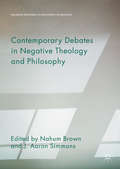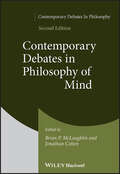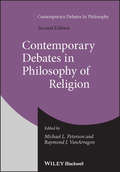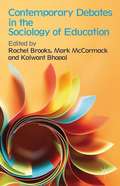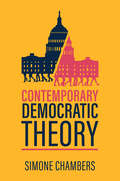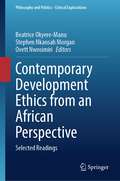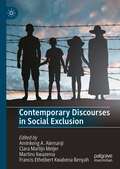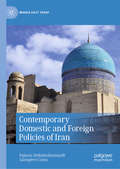- Table View
- List View
Contemporary Athletics & Ancient Greek Ideals
by Daniel A. DombrowskiDespite their influence in our culture, sports inspire dramatically less philosophical consideration than such ostensibly weightier topics as religion, politics, or science. Arguing that athletic playfulness coexists with serious underpinnings, and that both demand more substantive attention, Daniel Dombrowski harnesses the insights of ancient Greek thinkers to illuminate contemporary athletics. Dombrowski contends that the ideas of Plato, Aristotle, and Plotinus shed important light on issues—such as the pursuit of excellence, the concept of play, and the power of accepting physical limitations while also improving one’s body—that remain just as relevant in our sports-obsessed age as they were in ancient Greece. Bringing these concepts to bear on contemporary concerns, Dombrowski considers such questions as whether athletic competition can be a moral substitute for war, whether it necessarily constitutes war by other means, and whether it encourages fascist tendencies or ethical virtue. The first volume to philosophically explore twenty-first-century sport in the context of its ancient predecessor, Contemporary Athletics and Ancient Greek Ideals reveals that their relationship has great and previously untapped potential to inform our understanding of human nature.
Contemporary Black Thinkers in the Diaspora and Their Conceptualizations of Africa
by Abdul Karim BanguraThis book contends that Afrocentricity and other ideas birthed by major contemporary Black thinkers in the Diaspora are wellsprings for helping to build a new Africa. This book examines these ideas, which have given rise to the Africanist Perspective on the Motherland to place Africa at the center of all intellectual discourses pertaining to African people everywhere while at the same time challenging the pervasive and pernicious Eurocentric myth of African people being inactive agents in history. These contributions from a global range of scholars across disciplines examine the work of contemporary great Black thinkers as sources that can be employed to help in the construction of a new Africa. Each chapter examines how these thinkers conceptualized Africa in their works, with the main objective of delineating their conceptualizations to generate suggestions on how to rebuild the continent.
Contemporary British Philosophy: Personal Statements First Series (Muirhead Library Of Philosophy Ser.)
by J. H. MuirheadFirst published in 2002. Routledge is an imprint of Taylor & Francis, an informa company.
Contemporary British Philosophy: Personal Statements Third Series (Muirhead Library Of Philosophy Ser.)
by Lewis, H DThis is Volume IX of twenty-two in a collection on 20th Century Philosophy. Originally published in 1964, this text is volume three of three on contemporary British Philosophy and includes personal statements from varied contributors of the time.
Contemporary British Philosophy: Personal Statements Fourth Series (Muirhead Library Of Philosophy Ser.)
by Lewis, H DFirst published in 2002. Routledge is an imprint of Taylor & Francis, an informa company.
Contemporary British Philosophy: Personal Statements Second Series (Muirhead Library Of Philosophy Ser.)
by J. H. MuirheadThis is Volume VII of twenty-two of a series on 20th Century Philosophy. Originally published 1925, in this is part two of three offering a collection personal statements by leading philosophical theorists-James Ward, E. Belfort Bax, G.E. Moore, Clement C.J. Webb, G. Dawes Hicks and others.
Contemporary Capitalism, Crisis, and the Politics of Fiction: Literature Beyond Fordism (Routledge Studies in Contemporary Literature)
by Roberto del Valle AlcaláContemporary Capitalism, Crisis, and the Politics of Fiction: Literature Beyond Fordism proposes a fresh approach to contemporary fictional engagements with the idea of crisis in capitalism and its various social and economic manifestations. The book investigates how late-twentieth and twenty-first-century Anglophone fiction has imagined, interpreted, and in most cases resisted, the collapse of the socio-economic structures built after the Second World War and their replacement with a presumably immaterial order of finance-led economic development. Through a series of detailed readings of the words of authors Martin Amis, Hari Kunzru, Don DeLillo, Zia Haider Rahman, John Lanchester, Paul Murray and Zadie Smith among others, this study sheds light on the embattled and decidedly unstable nature of contemporary capitalism.
Contemporary Confucianism in Thought and Action (China Academic Library)
by Guy AlittoThis volume focuses on contemporary Confucianism, and collects essays by famous sinologists such as Guy Alitto, John Makeham, Tse-ki Hon and others. The content is divided into three sections - addressing the "theory" and "practice" of contemporary Confucianism, as well as how the two relate to each other - to provide readers a more meaningful understanding of contemporary Confucianism and Chinese culture. In 1921, at the height of the New Culture Movement's iconoclastic attack on Confucius, Liang Shuming (梁漱溟) fatefully predicted that in fact the future world culture would be Confucian. Over the nine decades that followed, Liang's reputation and the fortunes of Confucianism in China rose and fell together. So, readers may be interested in the question whether it is possible that a reconstituted "Confucianism" might yet become China's spiritual mainstream and a major constituent of world culture.
Contemporary Conspiracy Culture: Truth and Knowledge in an Era of Epistemic Instability (Conspiracy Theories)
by Jaron HarambamIn this ethnographic study, the author takes an agnostic stance towards the truth value of conspiracy theories and delves into the everyday lives of people active in the conspiracy milieu to understand better what the contemporary appeal of conspiracy theories is.Conspiracy theories have become popular cultural products, endorsed and shared by significant segments of Western societies. Yet our understanding of who these people are and why they are attracted by these alternative explanations of reality is hampered by their implicit and explicit pathologization. Drawing on a wide variety of empirical sources, this book shows in rich detail what conspiracy theories are about, which people are involved, how they see themselves, and what they practically do with these ideas in their everyday lives. The author inductively develops from these concrete descriptions more general theorizations of how to understand this burgeoning subculture. He concludes by situating conspiracy culture in an age of epistemic instability where societal conflicts over knowledge abound, and the Truth is no longer assured, but "out there" for us to grapple with. This book will be an important source for students and scholars from a range of disciplines interested in the depth and complexity of conspiracy culture, including Anthropology, Cultural Studies, Communication Studies, Ethnology, Folklore Studies, History, Media Studies, Political Science, Psychology and Sociology. More broadly, this study speaks to contemporary (public) debates about truth and knowledge in a supposedly post-truth era, including widespread popular distrusts towards elites, mainstream institutions and their knowledge.
Contemporary Continental Philosophy
by Robert D'AmicoContemporary Continental Philosophy steps back from current debates comparing Continental and analytic philosophy and carefully, yet critically outlines the tradition's main philosophical views on epistemology and ontology. Forgoing obscure paraphrases, D'Amico provides a detailed, clear account and assessment of the tradition from its founding by Husserl and Heidegger to its challenge by Derrida and Foucault. Though intended as a survey of this tradition throughout the twentieth century, this study's focus is on the philosophical problems which gave it birth and even now continue to shape it.The book reexamines Husserl as an early critic of epistemological naturalism whose grasp of the philosophical importance of the theory of meaning was largely ignored. Heidegger's contrasting effort to revive ontology is examined in terms of his distinction between ontic and ontological questions. In contrast with many earlier studies, the author outlines confusions engendered by the misappropriation of the distinct philosophical agendas of Husserl and Heidegger by such famous figures as Sartre and Merleau-Ponty. The book is also original in its emphasis on how social externalism in epistemology, inspired by Karl Mannheim, influenced this tradition's structuralist and Marxist phases. The philosophical defenses of a theory of interpretation by Gadamer and Habermas are closely examined and assessed and the study concludes with a a probing yet balanced account of Foucault and Derrida as critics of philosophical autonomy. The book concludes by reassessing this century-long divide between the analytic and Continental traditions and its implication for the future of philosophy.
Contemporary Continental Philosophy: The New Scepticism (Routledge Library Editions: Continental Philosophy #1)
by Stuart SimThis title was first published in 2000. Contemporary continental philosophy is a widely-used, but in many ways a highly problematic, term and its exact frame of reference is not always clear. In its more recent French manifestations in particular, it continues to arouse considerable controversy and create bitter divisions, with particularly hostile reactions to the work of Derrida and others. Much work in the recent continental tradition can be fitted into a longer-running philosophical tradition of scepticism, and scepticism has always had the power to provoke and unsettle the philosophical establishment. Presenting an overview of the philosophical landscape of the continental tradition since the 1940s, this book traces the establishment of the new, super-scepticism as an intellectual paradigm with the power to threaten and disorientate existing world-views and more traditional styles of philosophical discourse - marking the continental divide. Exploring how contemporary continental philosophy from existentialism to postmodernism can be characterised as this new, more resistant form of scepticism, Sim identifies a clutch of key themes - including "difference", "the subject", "antifoundationalism", "dialectics" - which have been obsessively worked over by key thinkers in the Existentialist-Postmodernist period and demonstrates how these have contributed to the development of a super-sceptical outlook. Presenting a new theme-led approach to provide an entry into current debates in continental philosophy, Stuart Sim reintegrates the work of Sartre into the more recent continental tradition, and suggests that something qualitatively different is now occurring in French philosophy.
Contemporary Critiques of Political Economy: Mapping Alternative Planetary Futures
by Ananta Kumar GiriThis book analyses contemporary critiques of political economy and highlights the challenges to rethinking contemporary discourses and practices. It carries out a multi-pronged critical and transformative dialogue involving political economy, moral economy, moral sociology, moral anthropology, and spiritual ecology. The authors discuss diverse themes such as the relationship between consciousness and society, the dialogue between Karl Marx and Carl Gustav Jung, a critical sociology of morality and property relations, moral and political economy of the Indigenous peoples and a critique of modern civilization, economic evaluation, as well as alternative traditions of thinking in Marx, Thoreau, Gandhi, J.C. Kumarappa, Rammanohar Lohia, B.R. Ambedkar and Jayaprakash Narain. A unique transdisciplinary text, the book brings together authors and approaches from both the Global North and South. It will be indispensable to students, research scholars and teachers of humanities and social sciences in such fields as economics, sociology, philosophy, cultural studies and development studies.
Contemporary Cultural Theory: An Introduction
by Andrew Milner Jeff BrowittFirst Published in 2002. Routledge is an imprint of Taylor & Francis, an informa company.
Contemporary Debates in Applied Ethics (Contemporary Debates in Philosophy #7)
by Christopher Heath Wellman Andrew I. CohenNow in an updated edition with fresh perspectives on high-profile ethical issues such as torture and same-sex marriage, this collection pairs cogently argued essays by leading philosophers with opposing views on fault-line public concerns. Revised and updated new edition with six new pairs of essays on prominent contemporary issues including torture and same-sex marriage, and a survey of theories of ethics by Stephen Darwall Leading philosophers tackle colleagues with opposing views in contrasting essays on core issues in applied ethics An ideal semester-length course text certain to generate vigorous discussion
Contemporary Debates in Epistemology (Contemporary Debates in Philosophy #5)
by Ernest Sosa John Turri Matthias SteupFully updated with new topics covering the latest developments and debates, the second edition of this highly influential text retains its unique combination of accessibility and originality. Second edition of a highly influential text that has already become a standard in the field, for students and professional researchers alike, due to its impressive line-up of contributors, and its unique combination of accessibility and originality Twenty-six essays in total, covering 13 essential topics Features five new topics that bring readers up to speed on some of the latest developments in the field, and give them a glimpse of where it's headed: Should knowledge come first? Do practical matters affect whether you know? Is virtuous motivation essential to knowing? Can knowledge be lucky? Can evidence be permissive? Substantially updates two other debates: Is there immediate justification? Can belief be justified through coherence alone?
Contemporary Debates in Epistemology (Contemporary Debates in Philosophy)
by Ernest Sosa John Turri Matthias Steup Blake RoeberThe perfect introduction to contemporary epistemology, completely overhauled for its third edition In Contemporary Debates in Epistemology, pairs of specially commissioned essays defend opposing views on some of today’s most compelling epistemological issues and problems. Offering a unique blend of accessibility and originality, this timely volume brings together fresh debates on hotly contested issues to provide readers with the opportunity to engage in comparative analysis of constantly changing and developing epistemological concepts. Now in its third edition, Contemporary Debates in Epistemology features up-to-date coverage of the latest developments in the field. Entirely new essays examine questions of epistemic normativity and knowledge, the relationship between belief and credence, the possibility of internalist epistemology, epistemic instrumentalism, norms of assertion, the use of thought experiments in epistemology, and more. Presents a rigorous yet accessible introduction to the major topics in contemporary epistemology Contains head-to-head chapters offering forceful advocacy of opposing philosophical stances Focuses on core areas of epistemology Uses a lively debate format that sharply defines the issues and encourages further discussion All-new chapters provide fully updated coverage of new and emerging topics in epistemologyPart of the Wiley-Blackwell Contemporary Debates in Philosophy series, Contemporary Debates in Epistemology, Third Edition, remains an essential resource for advanced undergraduate philosophy majors, graduate students in philosophy, and epistemologists who want to keep current with contemporary epistemological debates.
Contemporary Debates in Metaphysics (Contemporary Debates in Philosophy)
by Dean W. Zimmerman Theodore Sider John HawthorneIn a series of thought-provoking and original essays, eighteen leading philosophers engage in head-to-head debates of nine of the most cutting edge topics in contemporary metaphysics. Explores the fundamental questions in contemporary metaphysics in a series of eighteen original essays - 16 of which are newly commissioned for this volume Features an introductory essay by the editors on the nature of metaphysics to prepare the reader for ongoing discussions Offers readers the unique opportunity to observe leading philosophers engage in head-to-head debate on cutting-edge metaphysical topics Provides valuable insights into the flourishing field of contemporary metaphysics
Contemporary Debates in Negative Theology and Philosophy (Palgrave Frontiers in Philosophy of Religion)
by J. Aaron Simmons Nahum BrownIn this volume, scholars draw deeply on negative theology in order to consider some of the oldest questions in the philosophy of religion that stand as persistent challenges to inquiry, comprehension, and expression. The chapters engage different philosophical methodologies, cross disciplinary boundaries, and draw on varied cultural traditions in the effort to demonstrate that apophaticism can be a positive resource for contemporary philosophy of religion.
Contemporary Debates in Philosophy of Mind (Contemporary Debates in Philosophy)
by Jonathan Cohen Brian P. McLaughlinA timely collection of debates concerning the major themes and topics in philosophy of mind, fully updated with new topics covering the latest developments in the field Contemporary Debates in Philosophy of Mind provides a lively and engaging introduction to the conceptual background, ongoing debates, and contentious issues in the field today. Original essays by more than 30 of the discipline’s most influential thinkers offer opposing perspectives on a series of contested questions regarding mental content, physicalism, the place of consciousness in the physical world, and the nature of perception and mental capacities. Written to appeal to non-specialists and professional philosophers alike, the second edition of Contemporary Debates in Philosophy of Mind features five entirely new debates on the relation between perception and cognition, whether pain is a natural kind, whether perception is best understood through representational content or direct contact with the world, whether we need imagination that goes beyond imagery and supposition, and whether perceptual contents are general, particular, or a hybrid. Presents 15 sets of specially commissioned essays with opposing viewpoints on central topics in philosophy of mind Offers head-to-head debates on central topics such as consciousness, intentionality, normativity, mental causation, materialism, and perception Provides a dynamic view of contemporary thinking about fundamental and controversial issues Includes a thorough introduction providing a comprehensive background to the issues explored in each debate Part of Wiley-Blackwell’s acclaimed Contemporary Debates in Philosophy series, Contemporary Debates in Philosophy of Mind, Second Edition is essential reading for undergraduate and graduate students, academics, professional philosophers, and sophisticated general readers with an interest in the subject.
Contemporary Debates in Philosophy of Religion (Contemporary Debates in Philosophy #Vol. 1)
by Raymond J. VanArragon Michael L. PetersonLively debates on controversial and compelling questions in the philosophy of religion — an updated edition of the bestselling title Building upon the reputation of the first edition, the extensively revised second edition of Contemporary Debates in Philosophy of Religion features fifteen essays which present arguments on some of the most central and controversial topics in philosophy of religion from the discipline’s most influential thinkers. Considering questions of both emerging and perennial interest from atheistic, theistic, and agnostic viewpoints, the book adopts the series structure which pairs essays espousing opposing perspectives on a particular question or theme in an engaging pro and con format. Following accessible introductions to each debate, the volume’s new and newly-revised contributions set the stage for thoughtful and lively discourse between philosophers in philosophy of religion and analytic theology. Debates range from vigorous disagreements between theists and their critics to arguments between theists of different philosophical and theological persuasions, highlighting points of contrast for readers while showcasing the field’s leading minds in dialogue. The head-to-head chapters offer forceful advocacy for some of the most compelling ideas, beliefs, and objections in the philosophy of religion, opening the conversation up to students to weigh the arguments and engage in comparative analysis of the concepts for themselves. Written to appeal to the non-specialist as well as the professional philosopher, Contemporary Debates in Philosophy of Religion is ideal as both a provocative primary text for coursework in analytical theology and philosophy of religion, and as a broad survey of the field for scholars and general readers with an interest in the questions which underpin contemporary philosophy of religion and theology.
Contemporary Debates in the Sociology of Education
by Mark Mccormack Rachel Brooks Kalwant BhopalThe sociology of education is a vibrant discipline which has been responsible for a number of profound shifts in how we understand society. With innovations in the discipline sitting alongside more traditional lines of enquiry that continue to demand attention, this edited volume brings together some of the most prominent sociologists working in education today to address a wide range of empirical and theoretical issues. Adopting an international perspective, this book - now in paperback -foregrounds cutting-edge research that highlights both the diversity and complexity of understanding education in society. Contemporary Debates in the Sociology of Education not only showcases the real strengths of the discipline but, by bringing together original, empirical work by leading scholars, it advances our sociological understanding, acting as a source of stimulation and debate for postgraduate students and academics, as well as a touchstone for undergraduates seeking to engage with the discipline.
Contemporary Democratic Theory
by Simone ChambersIs democracy worth saving? Responding to the erosion of democracy, philosophical debates have pivoted from analyzing the best forms of democracy to questioning what is so valuable about democracy to begin with, how we can save it, and whether it is indeed worth saving. Contemporary Democratic Theory charts this pivot and surveys the most important new developments in the philosophical, theoretical, and normative examination of the concept of democracy. Comparisons that dominated 20th century democratic theory - between direct democracy, participatory democracy, deliberative democracy, and agonistic democracy - are in the 21st century giving way to comparisons between democracy and its challengers: epistocracy, technocracy, meritocracy, oligarchy, and autocracy. Philosophical interest in the canonical figures of democratic theory like Aristotle, Rousseau and Mill is being eclipsed by damage control in the face populism, sinking trust in democratic institutions, failing political parties, and the spread of misinformation.Overarching epochal forces of crisis and threat are pushing democratic theory in new directions and towards new ideas. This refreshing and authoritative text identifies, explains, and evaluates the new directions taken by contemporary democratic theory in challenging times.
Contemporary Development Ethics from an African Perspective: Selected Readings (Philosophy and Politics - Critical Explorations #27)
by Beatrice Okyere-Manu Stephen Nkansah Morgan Ovett NwosimiriThis book offers fresh academic insights, reflections, questions, issues, and approaches to development ethics, taking into account, African values and ethics. Development ethics is an area of applied ethics that examines the moral issues involved in global, social, and economic transformation. While it is a relatively new discipline, there have been numerous scholarly publications on it from Western perspectives. However, only a few studies that focused on development ethics from the African perspective. To address this gap, the book seeks to answer critical questions such as "What does development mean to Africans?", "How can we measure development?", "Who gets to decide?", and "What constitutes just development in Africa?" With contributions from African scholars from diverse backgrounds, the book covers various development themes such as Theories and approaches to development ethics in Africa, Environmental Ethics and African Development, Ethics, Politics and African Development, Migration and African development, Gender, Ethics and Socio-economic Development in Africa, Education, Ethics and African development. It is an essential resource for researchers, lecturers, and students interested in political philosophy and African culture studies.
Contemporary Discourses in Social Exclusion
by Aminkeng A. Alemanji Clara Marlijn Meijer Martins Kwazema Francis Ethelbert Kwabena BenyahThis book looks into different forms of social exclusion in different societies or contexts. It is important to note that in some cases, social exclusion is fueled by the deprivation of economic resources, political and social rights. In contrast, social constructs or cultural norms constitute significant factors in other cases. At the subject (macro) level, this book opens up an avenue where researchers from different subjects can look into how central issues of their subject can be understood through the lenses of social exclusion. For example, historical perspectives of social exclusion, sociological perspectives of social exclusion, religiosity and social exclusion, gender perspectives of social exclusion, educational perspectives of social exclusion, etc. At the thematic (micro) level, this book looks into how specific themes like racism, the corona virus pandemic, albinism, media, sexuality and gender intersect with social exclusion. In doing all these, the book also provides a much-needed multidisciplinary and methodological understanding of issues of social exclusion.
Contemporary Domestic and Foreign Policies of Iran (Middle East Today)
by Pejman Abdolmohammadi Giampiero CamaThis book is a comprehensive analysis of the domestic and foreign politics of Iran, focusing on its complex nature from political, social and cultural perspectives. It has adopted a multidisciplinary approach, combining comparative politics and intellectual and modern history with international relations. It analyses the institutional structure of the Islamic Republic, the main political and social actors and alliances, as well as Iranian opposition forces both inside and outside the country. The book tries to simplify the seemingly intractable complexity of the Islamic Republic by demystifying it and using political science methods to prove that it is a peculiar hybrid regime.
